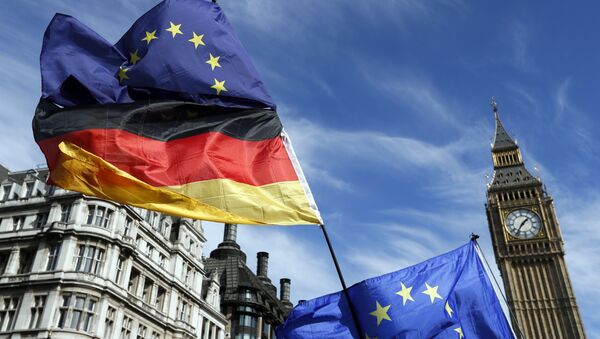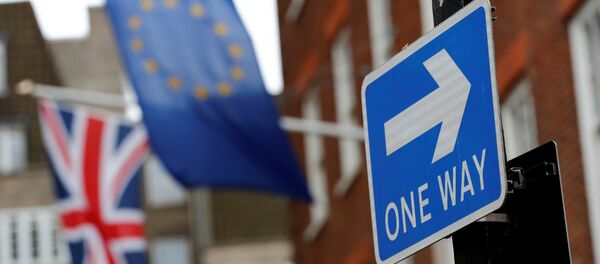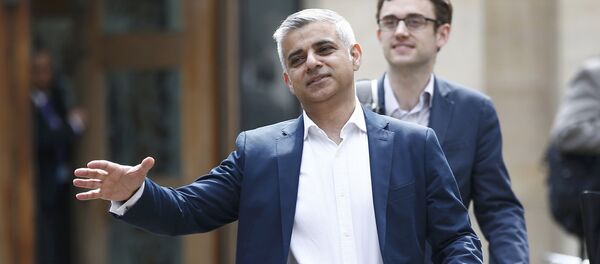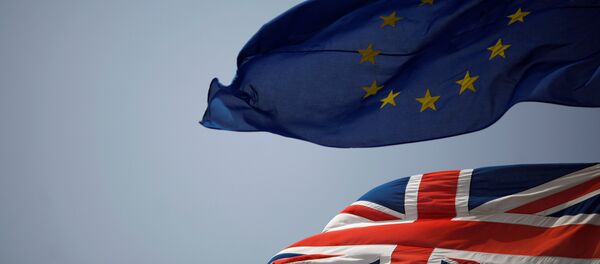On Tuesday, German media reported, citing the Finance Ministry, that Berlin would have to pay an extra 15 billion euros ($17.2 billion) annually to the EU budget in 2021-2027 in light of Brexit, as well as the bloc’s increased expenses on security and border defense.
The decision was also a response to the European Union’s consistent appeal for the member nations to increase their future contributions from 1 percent to 1.1 percent of gross national income.
'Why Should Other Nations Pay' for Brexit?
Heinrich Zertik from the Christian Democratic Union (CDU) party, a Bundestag member in 2013-2017, expressed his disagreement with the alleged need to increase payments to the bloc, arguing that Germany or any other member nation should not shoulder ramifications of the UK withdrawal.
"If a member nation has decided to leave the community, that's its business, but why should other countries pay anything? Of course, there should be contacts and friendship, but friendship is friendship, and there are certain limits. This will certainly be negatively perceived by German citizens. I am very critical of this," Zertik told Sputnik.
"Bad negotiation tactics [with the UK on Brexit]. The negotiation process will last until 2020 [so there is] no need to make any concessions now," Boehringer told Sputnik.
Roland Hartwig, the vice-chairman of the AfD party's parliamentary group in the Bundestag, in turn, expressed hope that one day the Germans would ask why they have to pay more and not less for a smaller European Union.
"Currently the government's revenue from taxes in Germany is at all-time high, so the increase will go forward basically unnoticed. This will probably change in the next economical regression and I expect people then to challenge the fact that Germany is paying more and not less for a significantly smaller European Union," Hartwig told Sputnik.
"Instead of doing so, Germany and many other member states are just anxious to continue thereby completely ignoring the signs on the wall," he opined.
Heftier Fees UNlikely to Be Backed by All EU Nations
Hartwig also doubted that all EU member nations would join the initiative to increase contributions to the EU budget, given the lack of public support and concrete prospects of additional benefits.
"I doubt that all EU-member states will increase their future contributions to 1.1 percent. The overall public acceptance of the EU is currently deteriorating in many countries and the national governments will be reluctant to spend more for the EU without being able to show additional benefits for their countries," he said.
"No, of course not, [not all member states will be able to increase their contribution to 1.1 percent of GNP]. There will be an open-ended negotiation process. Practically in 2018 Germany's and other [EU] countries´ payments were just 0.9 percent of GNP. Proposed increase to 1.1 percent is actually 10 perecent-20 percent in relative terms. Inflation comes on top, because even an unchanged number of 0.9 percent or 1 percent would lead to higher absolute payments each year due to growth of economies," Boehringer explained
According to Hartwig, references to security and border defenses were a poor justification for increased EU budget fees, since "no such effective border defense is in place."
Boehringer shared this stance, adding that the European Union in general needs to slash expenses, rather than ratchet them up, regardless of Brexit.
"EU needs to become a leaner regardless of Brexit. There is currently no such thing as 'better border defenses.' All Frontex would need to do is bring the boats back to the African coast. [This] does not cost anything, to the contrary," he noted.
"The figures in the media (30 or 45 bln euro per year) are just the tip of the iceberg. Germany’s contribution alone for EU payments including the payments for the permanent EU rescue are about 5-10x higher, 200-300 bln EUR p.a. – mostly in form of guarantees via ECB. This is what we oppose most. But the direct EU payment increase we oppose as well," Hartwig argued.
Given the proposed spike, Germany, the EU largest contributor, will likely pay 45 billion euros ($51 billion) to the bloc annually, according to media reports.





